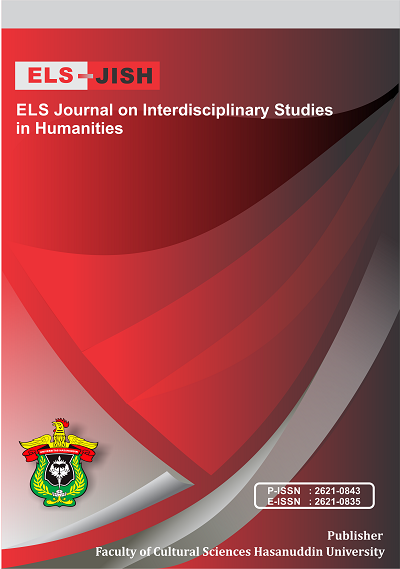The Influence of Language Use toward the Implementation of Public Service Ethics
DOI:
https://doi.org/10.34050/els-jish.v7i4.42281Keywords:
Language use, Descriptive Text, Empathy, PolitenessAbstract
This study investigates the role of language in the implementation of public service ethics, with a focus on Hajj services at the Ministry of Religious Affairs in Makassar City. It examines both verbal and non-verbal communication strategies used by public service professionals to understand how language influences ethical decision-making and interactions between service providers and the public. The research aims to explore how language choices support accountability, fairness, and transparency while encouraging ethical conduct in public institutions. Using a case study approach, the study concentrates on the interactions between Hajj service officers and prospective pilgrims during the registration, guidance, and procedural explanation stages. Data collection includes participatory observation of language use and non-verbal cues, such as gestures and intonation. The findings emphasize that key language characteristics like clarity, politeness, empathy, and motivational language play a crucial role in creating positive service experiences and promoting ethical behavior. The study concludes that strategic language use in public service fosters trust, transparency, and cooperation, enhancing relationships between service providers and the public and reinforcing a culture of accountability in public institutions.
References
Dalyan, M., Darwis, M., Rahman, F., & Latjuba, A. Y. (2022). Cultural discourse in Indonesian humor: A case study of some short dialogues. Theory and Practice in Language Studies, 12(5), 1009-1018.
Dolamore, S., & Whitebread, G. (2022). Recalibrating public service: Valuing engagement, empathy, social equity, and ethics in public administration. Public Integrity, 24(4-5), 375-386.
Chipman, S. A., Meagher, K., & Barwise, A. K. (2024). A public health ethics framework for populations with limited English proficiency. The American Journal of Bioethics, 24(11), 50-65.
Chomsky, N. (1965). Aspects of the theory of syntax. MIT Press.
Hidayatullah, D., & Sosrohadi, S. (2022). Analysis of Shopping Behavior Effect on Customer Loyalty with Satisfaction as Intervening Variable at PT. Indofood Sukses Makmur, Tbk. American Journal of Humanities and Social Sciences Research (AJHSSR), 6(11), 215-224.
Prihandoko, L. A., Tembang, Y., Marpaung, D. N., & Rahman, F. (2019, October). English language competence for tourism sector in supporting socio-economic development in Merauke: A Survey Study. In IOP Conference Series: Earth and Environmental Science (Vol. 343, No. 1, p. 012170). IOP Publishing.
Rahman, F., & Weda, S. (2019). Linguistic Deviation and The Rhetoric Figures in Shakespeare’s Selected Play. XLinguage “European Scientific Language Journal,” 12 (1), 37–52.
Rauh, C. (2023). Clear messages to the European public? The language of European Commission press releases 1985–2020. Journal of European integration, 45(4), 683-701.
Said, M. M., Rita, F., Weda, S., & Rahman, F. (2021). English Language Performance Development Through Extracurricular Activities At Faculty Of Teacher Training And Education Tadulako University Palu. PalArch's Journal of Archaeology of Egypt/Egyptology, 18(08), 388-403.
Simon, H. A. (1947). Administrative behavior: A study of decision-making processes in administrative organizations. Free Press.
Sosrohadi, S., Syukri, M., & Sosrohadi, A. A. (2024). Unveiling Political Persuasion: Speech Acts in the 2024 Indonesian Presidential Candidates' Speech Texts. ELS - Journal on Interdiciplinery Studies in Humanities, 7(1), 170-179.
Sukmawaty, Rahman, F. F., & Andini, C. (2022). Covid-19 Pandemic and Axiology of Communication: A Study of Linguistic Phenomena. IJISRT, 7(4).
Sukmawaty, S., Andini, C., & Rahman, F. F. (2022). The Shift of Honorifics due to The Promotion As A Government Official: Comparative Study. ELS Journal on Interdisciplinary Studies in Humanities, 5(1), 166-176.
Tong, P., Yin, Z., & Tsung, L. (2024). Student engagement and authentic language use on WeChat for learning Chinese as a foreign language. Computer Assisted Language Learning, 37(4), 687-719.
Tran, V. H., McLeod, S., Verdon, S., & Wang, C. (2024). Vietnamese-Australian parents: Factors associated with language use and attitudes towards home language maintenance. Journal of Multilingual and Multicultural Development, 45(2), 489-506.
Yan, L., Sha, L., Zhao, L., Li, Y., Martinez‐Maldonado, R., Chen, G., ... & Gašević, D. (2024). Practical and ethical challenges of large language models in education: A systematic scoping review. British Journal of Educational Technology, 55(1), 90-112.
Yaumi, M. T. A. H., Rahman, F., & Sahib, H. (2024). Bridging Language and Technology through Semiotic Technology. International Journal of Social Science Research and Review, 7(1), 52-61.
Downloads
Published
How to Cite
Issue
Section
License
Copyright (c) 2024 Mansyur Suma, Irwan Misbah, Somadi Sosrohadi, M. Dalyan Dalyan

This work is licensed under a Creative Commons Attribution-ShareAlike 4.0 International License.






